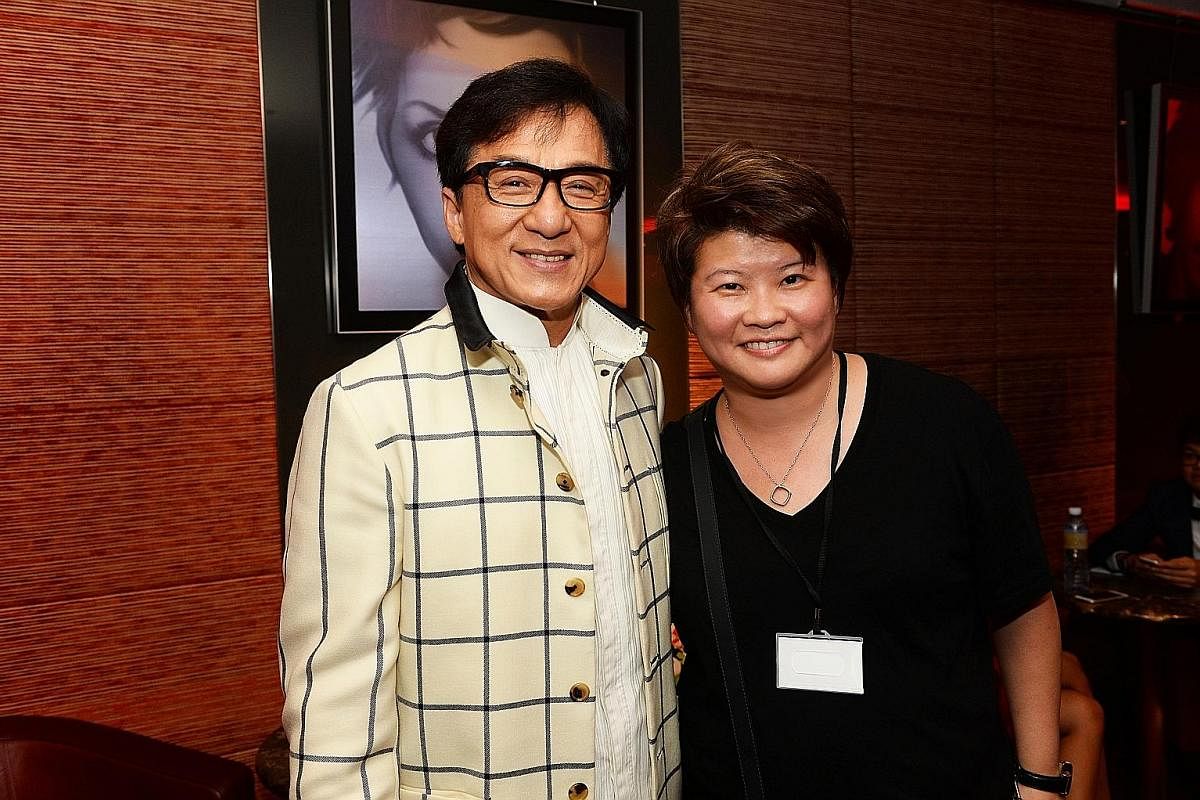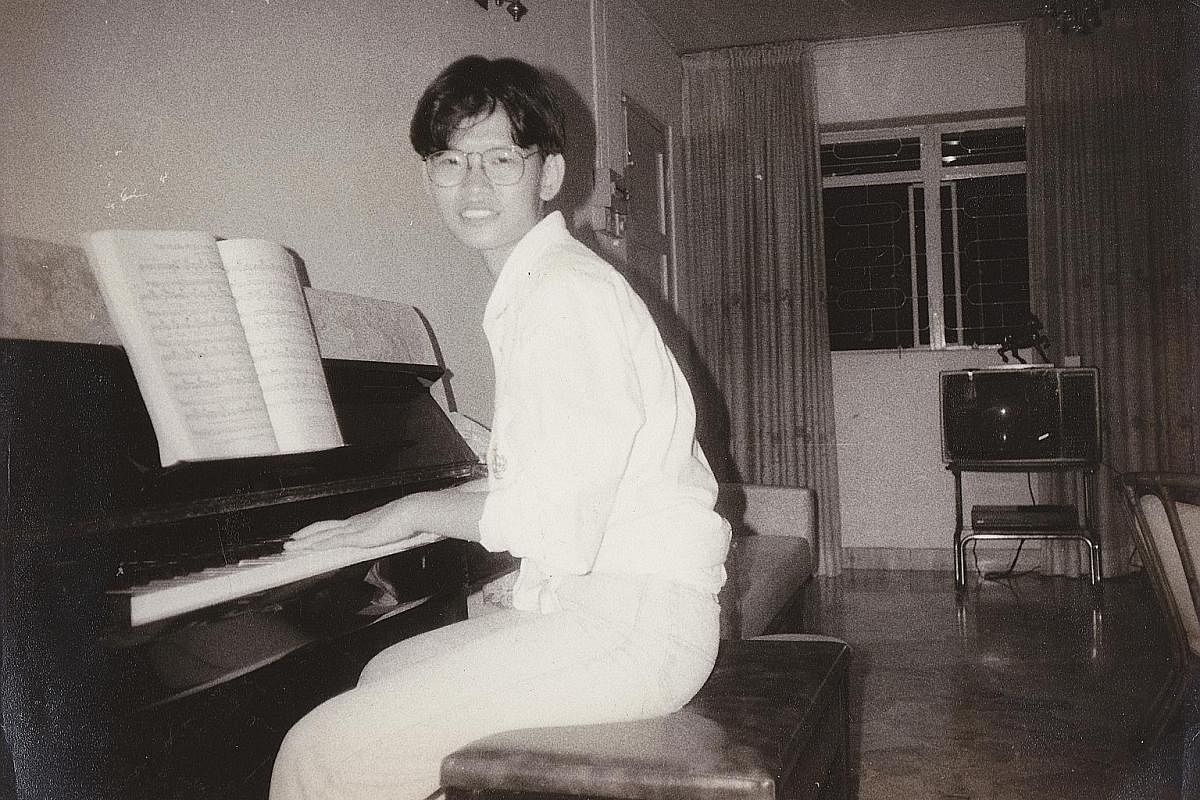The Life Interview With Joyce Lee
The Life Interview: Encore Films founder Joyce Lee went from importer to film-maker
Encore Films founder Joyce Lee went from being an importer to a film-maker


Ms Joyce Lee loves cars.
She owns a Maserati GranTurismo and a Mercedes-Benz E250. Together, they cost the managing director of Encore Films $750,000.
She loves the Italian sports machine because of its throaty rumble and handling, while the more placid Mercedes four-door is her choice when passenger comfort is a priority.
The cars are a status symbol and that is the point: When the daughter of an absentee father and a hotel housekeeper mother was younger, she vowed that she would one day afford her dream car.
"The cars help me remember how I used to be. They remind me that back then, I had targets," she says.
Those financial targets having been achieved a few years ago, she bought the cars and paid for them upfront and in full.

Ms Lee, 42, founded film distributor Encore Films in 2003. It has not just thrived, but has also grown its slate of films with each passing year, when its rivals have vanished.
Small distributors such as Encore import foreign films into Singapore, competing with the likes of deep- pocketed major players such as Shaw Organisation, Cathay-Keris Films and Golden Village, firms which have the advantage of owning their own cinemas.
To survive, Encore did what all independent operators have to do - find its own niche. Its rivals might opt to buy European arthouse or global festival favourites aimed at cinephile audiences.
But Encore's speciality is Japanese films. The more mass appeal, the better. It imported the comic book- inspired Death Note and Attack On Titan films from Japan, for example. Gintama, a manga-based action comedy now in cinemas, is its latest release.
Encore also buys some non-Japanese Asian titles, such as the Cold War thrillers from Hong Kong.
It shipped in Hollywood-linked films, such as fantasy epic Dragon Blade (2015), starring Jackie Chan, John Cusack and Adrien Brody. The movie made $2.5 million at the local box office last year, in the same ballpark as Sony's The Angry Birds Movie (2016).
Encore is tiny - there are only eight people, including Ms Lee, in its office in a nondescript building in the Kaki Bukit industrial district.
We chat in her office conference room. It is filled with the stuff of her trade - posters, DVDs and other memorabilia. She speaks with a strong, confident tone and her anecdotes are filled with emotion and drama - you can see how she can move cinema owners to give their screens to her movies or cut deals with film sales agents.
A calligraphy scroll takes centre stage on her office walls. It says "xing qing shi da" - a clear mind achieves great things.
Just outside the conference room is where movie trailers are cut, subtitles written, posters designed and social media pages edited, for Singapore and places where it distributes films, such as Indonesia, Hong Kong, Taiwan, Malaysia and Brunei. She plans to add more countries in South-east Asia in the coming years.
She bought the video-editing suite and employs people to operate it because, as she admits, she is a control freak. "I used to make trailers at a production house. But I stressed them so much they didn't want my business any more," she says.
But that quest for perfection endears her to Japanese sales agents and business partners. "They believe in long-term partnerships. They sell films to me even if my competitors offer them a higher fee," she says.
They trust her because she respects their opinion on things that others consider trivial, such as seeking approval for minor changes to marketing design.
That respect is mutual. They admire her doggedness in taking their content into new markets.
When she won the licence to distribute the fantasy Your Name (2016) in Vietnam, she tried her usual approach, which is to verbally persuade cinema chains to give her movie as many screens as possible.
She hit a wall. No one there shared her belief that there is a large and growing fan base for anime in their country.
Her game plan then was to place a "coming soon" teaser for the anime on the company's Facebook page for Vietnam. After it gained hundreds of thousands of likes and shares, she went back to the cinema operators.
"I told them, 'Give it a try.' So they tested it on 20 screens," she says.
That surged to 95 screens in the following weeks, driven by demand. The film grossed close to $1 million in Vietnam, a figure approaching what a Hollywood release might earn. "Now they keep asking us for new Japanese films," she says.
Ms Lee, who is single, could have just let it be business as usual at Encore. After all, her car licence plates and, at one time, her company van, say "2222". In Cantonese, "2" and "easy" sound similar, so the number is a call for smoothness in business and life.
But last year, for the first time, the importer of films became a maker, with the drama-comedy Young & Fabulous (2016).
Ms Lee bankrolled and co- directed the Mandarin film. It starred faces such as Henry Thia, Gurmit Singh, Quan Yi Fong and newcomers such as Aloysius Pang, Joyce Chu and Joshua Tan. The story revolved around the hobby of cosplaying - dressing up like characters from video games, television shows and movies.
The film was neither a box-office hit nor a disaster. It earned $1.3 million at the Singapore box office on a budget of $1.5 million. It has broken even after adding foreign sales and other rights, she figures.
She was forced into the co-director's chair, she says. The first director she hired left because his vision differed from hers. She wanted to protect her vision because it was inspired by her chats with cosplayers who show up at her film events.
With the clock ticking down to the start of production, she took over. Veteran director Michael Woo was hired to sit in the co-director's chair, handling the technical areas while she guided actors' performances.
"Everything that could go wrong went wrong," she says.
Footage went missing. Pang burst a blood vessel in his eye, a literal eyesore that had to be fixed with computer graphics.
Despite the blunders - some of which she attributes to her lack of experience - she is now developing Encore's second in-house feature. Like her first movie, it will be a wholesome youth-oriented comedy with a message about celebrating differences. She hopes to release it in the second half of next year.
"It's about a supermodel who overnight changes into someone who weighs 120kg," she says.
She will be the project's sole director because she thinks she has learnt enough to handle the film's most challenging areas - finding an actress with the talent to play the lead while wearing a thick layer of "fattening" prosthetics, and finding a special-effects crew capable of making those prosthetics.
Ms Lee has been jumping into challenging situations from an early age. Her father, who died in 2008, spent most of his time in Malaysia, dropping in at the flat in Choa Chu Kang on the occasional weekend. She is hazy as to what job he had, or if he even had one.
Her mother, now 69, supported her and her two older twin brothers, now in their late 40s, with her hotel housekeeping job. Her brothers now work in sales.
As a teen, she supported herself with factory jobs, giving tuition and doing hotel kitchen work, "cleaning prawns for $4 an hour", she recalls.
She managed to enrol into the competitive Nanyang Girls' High School before moving on to Anglo-Chinese Junior College.
She quickly realised it was not for her - it had "too many rich kids" and the English-speaking environment felt alien after her Chinese- leaning secondary school.
She took up accounting at Ngee Ann Polytechnic, later supplemented by a business administration degree earned through long- distance learning.
Ms Lee was desperate to be in the entertainment business. She loved movies, had been in drama clubs in school, had worked part-time as a singer and sung in talent shows.
She reckons she must have sent Mediacorp her resume 20 times, without luck. In 2000, the company was growing its dot.com ventures and Ms Lee was finally accepted into one of its digital divisions.
She managed to stay on as a business development executive despite the dot.com bust, by moving on to its television arm. She eventually moved into buying movies, a position that taught her volumes about Singapore preferences ("An old Jackie Chan movie, even if it has been aired 10 times, will draw a bigger viewership than a new Hong Kong romantic comedy.")
By 2003, she was ready to leave. She loved the movie-watching part of her job, but hated the report- filling that many areas of her job required.
South Korean films at the time were largely unknown here, but she had come across the horror work Wishing Stairs (2003) which she thought had potential.
Then 28, she was so sure it would work that she staked everything she had to gather the $45,000 rights fee. She quit Mediacorp, founded Encore, maxed out her credit cards and borrowed cash from her mother.
Her instincts were right. Wishing Stairs cleared a profit of $500,000.
But in helping to kick-start the craze for South Korean films, she helped drive their sales fees through the roof, causing her to look to Japan and elsewhere for material.
Ms Clara Cheo, chief executive of exhibitor and distributor Golden Village, first met Ms Lee in 2013 and was struck by her passion for films and her drive for perfection, a mix that makes her something of a workaholic, she says.
"She works day and night to cut and recut trailers to achieve the effect she wants. She's very hands- on," says Ms Cheo, 52. Golden Village and Encore Films have a close business partnership.
Ms Lee is well aware of her reputation for driving herself and others hard. "I come from a poor family, my priority has been to make money. I had to reach my targets," she says.
She is trying to slow down, especially after an accident in 2010. She was hit by a bus in Los Angeles after it veered into the bus stop at which she was waiting. She escaped with heavy bruises, with no broken bones. She looks fine now, but its psychological impact has been more permanent. The crash focused her mind on things that matter: family and friends.
Ms Lee hopes to make at least one film a year, mentoring young film- makers and helping them get their work distributed overseas. "I told myself I would spend a few more years earning money, but once I have that, I will do the things I want to do. This is where I am now."
Join ST's Telegram channel and get the latest breaking news delivered to you.
A version of this article appeared in the print edition of The Straits Times on August 07, 2017, with the headline The Life Interview: Encore Films founder Joyce Lee went from importer to film-maker. Subscribe

